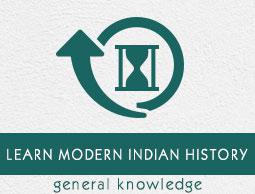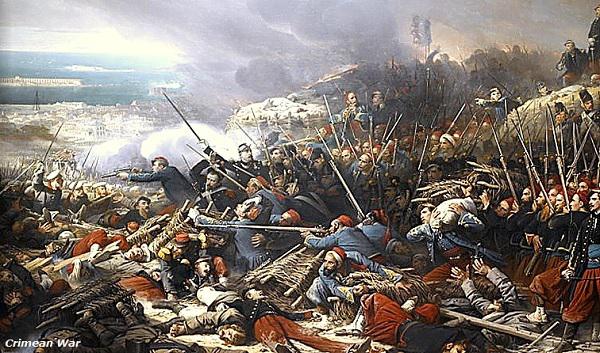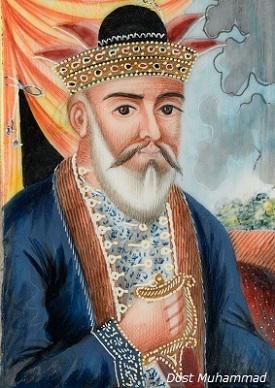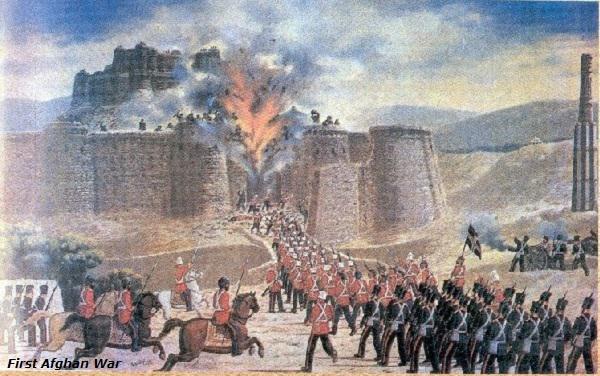Dost Muhammad Khan was therefore in dire need of powerful friends. And, since he had a high regard for English strength, he desired some sort of an alliance with the Government of India.
The Russians tried to convince Dost Mohammad Khan, but he refused to comply. While discouraging the Russian envoy, he adopted a friendly attitude towards the British envoy, Captain Burns. But he failed to get adequate terms from the British who would not offer anything more than a verbal sympathy.
The British wanted to weaken and end Russian influence in Afghanistan, but they did not want a strong Afghanistan. They wanted to keep her a weak and divided country which they could easily control.
Lord Auckland, the Indian Governor-General, offered Dost Muhammed an alliance based on the subsidiary system.
Dost Muhammed wanted to be an ally of the British Indian Government on the basis of complete equality and not as one of its puppets or subsidiary allies.
Having tried his best to acquire British friendship, but failed, Dost Muhammad reluctantly turned towards Russia.
Auckland now decided to replace Dost Mohammed with a friendly i.e. subordinate ruler. His gaze fell on Shah Shuja, who had been deposed from the Afghan throne in 1809 and since then living at Ludhiana as a British pensioner.
On 26 June 1838, the Indian Government, Maharaja Ranjit Singh, and Shah Shuja signed a treaty at Lahore (three allies) by which the first two promised to help Shah Shuja capture power in Afghanistan and, in return, Shah Shuja promised not to enter into negotiations with any foreign state without the consent of the British and the Punjab Governments.
The three allies launched an attack on Afghanistan in February 1839. But Ranjit Singh cleverly hung back and never went beyond Peshawar. The British forces had not only to take the lead but to do all weary fighting.
Most of the Afghan tribes had already been won over with bribes. Kabul fell to the English on 7 August 1839, and Shah Shuja was immediately placed on the throne.
Shah Shuja was detested and despised by the people of Afghanistan, especially as he had come back with the help of foreign bayonets.
The Afghani people resented British interference in their administration. Gradually, the patriotic, freedom-loving Afghans began to rise up in anger and Dost Muhammed and his supporters began to harass the British army.
Dost Muhammed was captured in November 1840 and sent to India as a prisoner. But popular anger went on increasing and more and more Afghan tribes rose in revolt.
Then suddenly, on 2 November 1841, art uprising broke out at Kabul and the sturdy Afghans fell upon the British forces.
On 11 December 1841, the British were compelled to sign a treaty with the Afghan chiefs by which they agreed to evacuate Afghanistan and to restore Dost Mohammed.
As the British forces withdrew, the Afghan were attacked all along the way. Out of 16,000 men, only one reached the frontier alive, while a few others survived as prisoners.
The entire Afghan adventure ended as total failure. It had proved as one of the greatest disasters suffered by the British arms in India.
The British Indian Government now organized a new expedition. Kabul was reoccupied on 16 September 1842.
But it had learnt its lesson well, having avenged its recent defeat and humiliation, it arrived at a settlement with Dost Mohammed by which the British evacuated Kabul and recognized him as the independent ruler of Afghanistan.
Afghan War cost India over one and a half crores of rupees and its army, about 20,000 men.
A new period of Anglo-Afghan friendship was inaugurated in 1855 with the signing of a treaty of friendship between Dost Mohammed and the Government of India.
The two governments promised to maintain friendly and peaceful relation, to respect each other's territories, and to abstain from interfering in each other's internal affairs.
Dost Mohammed also agreed that he would be "the friend of the friends of the East India Company and the enemy of its enemies." He remained loyal to this treaty during the Revolt of 1857 and refused to give help to the rebels.
After 1964, the policy of non-interference was vigorously pursued by Lord Lawrence and his two successors. As Russia again turned its attention to Central Asia after its defeat in the Crimean War; however, the British followed the policy of strengthening Afghanistan as a powerful buffer.
The British gave the Amir of Kabul aid and assistance to help him discipline his rivals internally and maintain his independence from foreign enemies. Thus, by a policy of non-interference and occasional help, the Amir was prevented from aligning himself with Russia.
The policy of non-interference did not, however, last very long. From 1870 onwards, there was a resurgence of imperialism all over the world. The Anglo-Russian rivalry was also intensified.
The British Government was again keen on the commercial and financial penetration of Central Asia.
Anglo-Russian ambitions clashed ever, more openly in the Balkans and West Asia.
The British statesmen once again thought of bringing Afghanistan under direct political control so that it could serve as a base for British expansion in Central Asia.
The Indian Government was directed by London to make Afghanistan a subsidiary state whose foreign and defence policies would be definitely under British control.
Sher Ali, the Afghan ruler or Amir, was fully conscious of the Russian danger to his independence and he was, therefore, quite willing to cooperate with the British in eliminating any threat from the North.
Sher Ali offered the Government of India a defensive and offensive alliance against Russia and asked it for promise of extensive military aid in case of need against internal or foreign enemies.
The Indian Government refused to enter into any such reciprocal and unconditional commitment. It demanded instead the unilateral right to keep a British mission at Kabul and to exercise control over Afghanistan's foreign relations.
When Sher Ali refused to comply, he was declared to be anti-British and pro-Russian in his sympathies.
Lord Lytton, who had come to India as Governor-General in 1876, openly declared: "A tool in the hands of Russia, I will never allow him to become. Such a tool it would be my duty to break before it could be used."
Lytton proposed to effect "the gradual disintegration and weakening of the Afghan power."
To force British terms on the Amir, a new attack on Afghanistan was launched in 1878. Peace came in May 1879 when Sher Ali's son, Yakub Khan, signed the Treaty of Gandamak by which the British secured all they had desired.
They secured certain border districts, the right to keep a Resident at Kabul, and control over Afghanistan's foreign policy.
The British success was short lived. The national pride of the Afghans had been hurt and once again they rose to defend their independence.
On 3 September 1879, the British Resident, Major Cavagnari, and his military escort were attacked and killed by rebellious Afghan troops. Afghanistan was again Invaded and occupied.







